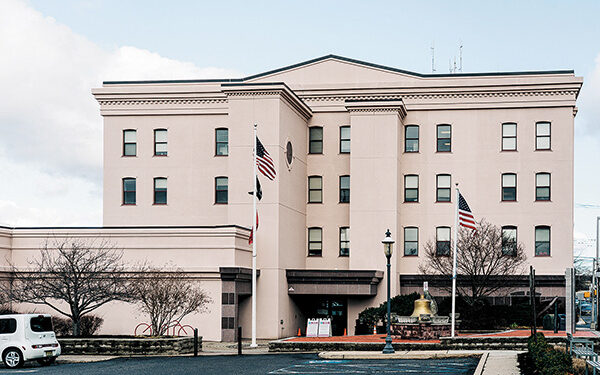
By Chris Rotolo
RED BANK – Borough charter study commissioners are mulling the recommendation of a particular form of government following a Phase II meeting with state official Edward Sasdelli.
Sasdelli, a technical advisor and state monitor for the New Jersey Department of Community Affairs, previously served as municipal manager of the Burlington County Township of Evesham, and failed to hide his affinity for the council-manager form of government.
In this form, the manager is hired by and works at the pleasure of the whole governing body, rather than a single mayor. Red Bank’s current borough form features a mayor-council structure, in which a business administrator is appointed by the mayor to implement policy adopted by the council.
The difference between the two is slight, but during the charter commission’s April 6 meeting Sasdelli insisted the distinction makes a big impact on day-to-day operations.
“It comes down to responsiveness and loyalty,” said Sasdelli, who previously appeared before the Red Bank Charter Commission in January. “In your current form, the fact is that the (business administrator’s) term runs concurrent with the mayor that appointed them. They know if the mayor isn’t reelected, they’re not going to be the (business administrator anymore). With that in mind, on those occasions when they’re tasked with providing the council unbiased business advice, you sometimes have to wonder if they can really give that advice if it’s going to hurt the mayor?”
Sasdelli said in his experience as a state monitor, and as a former manager, he has not witnessed that sort of bias in municipalities with a council-manager structure.
“When I was manager (in Evesham), I knew when I was saying something that was uncomfortable for the mayor or for the town, but I felt comfortable and empowered to say it, because I was saying it for the whole council. I was more unencumbered to give sound business advice when I was working for the whole, rather than single person,” Sasdelli said.
Commissioner Ben Forest posed a situation to Sasdelli, in which elected officials will “meddle” in the daily operations of borough employees, stating “it’s something I hear a lot about (in Red Bank).”
A documented chain of command is something Sasdelli said he implemented as municipal manager, and praised that governmental construct as a means to maintaining healthy separation between borough workers and the governing body.
During his tenure, while regular meetings were held with department heads, Sasdelli noted that he invited members of the governing body to attend, but instructed them not to participate. Instead, he served as the point person, accepting policy and priorities of the council and dictating the information to department leadership.
“As a manager, I would drill down on the council for their priorities. ‘Tell me what you want and I’ll make it happen, but you can’t interfere.’ It seems to me, what’s happening (in Red Bank), is the mayor is directing the business administrator. And sometimes, what the mayor is directing them to do isn’t necessarily what the council wants done. But the mayor is giving the marching orders, and the council gets angry and brings it up at meetings,” Sasdelli added.
Commissioner Michael DuPont echoed a similar sentiment earlier in the meeting, citing a breakdown in governing when council members do not see eye-to-eye. It’s a derailment he hopes any potential recommendation from the commission could rectify.
“I think the chief thing we’ve taken away from past meetings is that we have a current form of government that has broken down, not because the form doesn’t work, but because the people don’t make it work,” said DuPont, noting that 218 of New Jersey municipalities operate under Red Bank’s current borough government structure.
“For over 100 years Red Bank has had the borough form, and at some point it stopped working because people didn’t stay in their lanes, or powers of the office weren’t protected. One thing we want to achieve is, regardless of people getting along, the government still has to work,” DuPoint added.
The commission is due to meet again Tuesday, April 19.
The article originally appeared in the April 14 – 20, 2022 print edition of The Two River Times.














